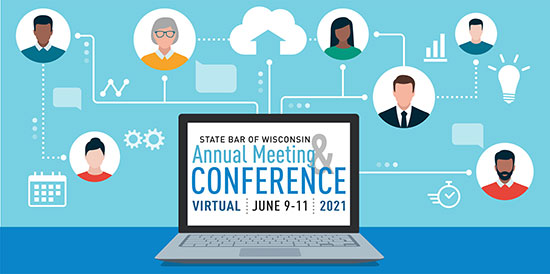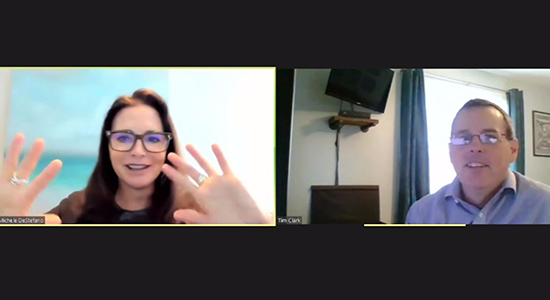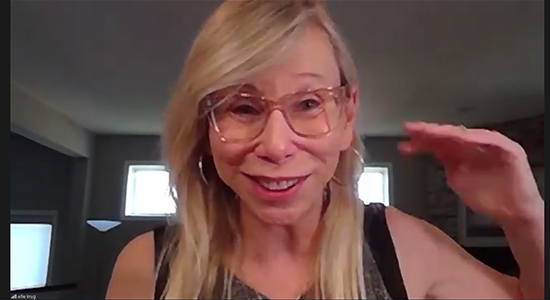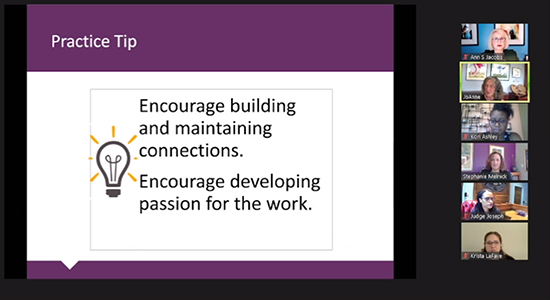
June 14, 2021 – The State Bar of Wisconsin‘s Annual Meeting & Conference last week brought judges, lawyers, and other legal professionals together to discuss a truly challenging year, what disruption has taught the legal profession, and other topics.
The State Bar’s Board of Governors kicked off the three-day event June 10 with its final meeting of FY 2021, and Cheryl Daniels was sworn in as the 66th State Bar president.
The Wisconsin Association of Legal Administrators (WALA) led pre-conference sessions on resilience, as well as diversity, equity, and inclusion, and Michele DeStefano – law professor at the University of Miami Law School, former marketing executive, and founder of Law Without Walls – delivered the opening plenary.
Jarrett Adams, who was wrongfully convicted and spent 10 years in prison before his exoneration and eventual graduation from law school, closed AMC with his story – his journey through Wisconsin’s criminal justice system as a young Black man.
In between, AMC attendees attended breakout sessions on technology, practice management, ethics, substantive law, and lawyer wellbeing. The virtual platform allowed lawyers to connect and learn together, despite remaining physically apart.
Here is a round-up of some of the sessions you may have missed. Watch the WisBar Marketplace for the recorded AMC sessions to become available for CLE credit. Those who attended AMC can access additional AMC sessions as a part of their registration.

Michele DeStefano, left – law professor at the University of Miami Law School, former marketing executive, and founder of Law Without Walls – talked about innovation in the legal profession.
Digital Transformation
“My mission is to try to convince all of you to learn some new skillsets and mindsets,” said DeStafano, who delivered an opening plenary program called, “Opportunities for Differentiation in a Digital World.”
DeStefano talked about an innovation tournament in law. “We were seeing innovation at every level, even before the pandemic, driven by a combination of technology, socioeconomics, and globality,” she said. “We see innovation on every dimension.”
She said this innovation isn’t just coming from legal technology companies, or so-called alternative legal service providers. It’s also coming from law firms, corporate legal departments, and the government. “They are creating innovations of their own.”
If you have changed the way in which you deliver legal services, such as using Zoom to connect with or service clients, you are playing in the innovation tournament.
“It’s a way for us to be more efficient and effective,” DeStefano said. “But it’s a new model, and it’s here to stay. Whether you work at a law firm, or a law company, or a law department, whether you work on your own, with the government or with a nonprofit – it’s even more important that we embrace the digital world. It should be our first priority.”
DeStefano said digital transformation is not just embracing new technology. “Digital transformation is about serving or customers differently, it’s about understanding who our competition is … using data to make better decisions, and adding value” she said.
Changed Genders, Changed Perspectives
In this program, Ellen “Ellie” Krug discussed her experience transitioning genders in 2009, from male to female, while a practicing law in Iowa, and how changing genders gave her new perspective on the obstacles that women face in the workplace.
“This talk is what it’s like, more than a decade in, to be female when for 52 years I presented as a dude. That’s what this talk is about,” said Krug, who runs Minneapolis-based Human Inspiration Works LLC and speaks and trains on inclusivity. “It’s about how the world is so incredibly different for me now as a woman.”
Krug, a trial lawyer who represented railroad and trucking companies before transitioning, said women leaders must continue to support each other, provide mentorship, and demand parity. Men can be allies for women, she said, by understanding the structural dynamics that exist within the legal profession.
“There is institutional masculinity baked into this profession,” she said. “Men must become equal partners with women, and ‘equal’ is the operative phrase.”

Ellen “Ellie” Krug discussed her experience transitioning genders in 2009, from male to female, while a practicing law in Iowa.
Views from the Bench
Numerous judges sat on panels to discuss how the Rules of Professional Conduct for Attorneys affect judicial decision-making, and civil litigation motion practice.
The judges gave practical tips on how lawyers can present their cases better, including suggestions on filing motions in the age of e-filing.
“For example, lawyers can really think about the ordering in which they e-file documents … to ensure the affidavits and exhibits follow a brief in a logical sequence,” said Milwaukee County Circuit Court Judge Laura Gramling Perez.
She said judges have different modes of viewing files on their judicial dashboards, but the typical case view is similar to the public view of the court record.
Judge Perez said lawyers should feel free to file a separate letter that sets a roadmap for the e-filed documents, or a table of contents that note the document numbers assigned to the documents assigned by the e-filing system.
“I do miss is the ability to quickly grab a paper document in a bundle of materials that are presented to me,” said Brown County Circuit Court Judge Mark Hammer.
“What I found to be extremely helpful … is when they cite a document that’s in the record, to cite it by document number. Nowadays, it doesn’t do me as much good for litigants to cite to a motion to dismiss or the affidavit of Elmer Brown.”
Judge Hammer said citing to a specific document number versus the name of the document allows him to find it much more quickly.
Ed Robinson of Cannon & Dunphy S.C., who moderated one of the “view from the bench” panels on motion practice, also asked judges to discuss their pet peeves.
For instance, Judge Hammer says he sometimes receives affidavits with supporting documents without pinpoint cites to a “deposition dump.” As a result, “I’m concerned I really won’t give it the attention the lawyer wants me to focus on,” Hammer said.
Lawyer Well-Being
A panel discussed the work of the Wisconsin Task Force on Lawyer Well-Being, a group of more than 40 members that is actively working to reduce the stigma of substance abuse and mental health issues in the Wisconsin legal profession.
A final report, which is scheduled for release in the coming months, will include recommendations on systemic changes to reduce the stresses that cause personal challenges and allow people to address their well-being when the need arises.
Lindsey Draper, a member of the task force and a board member at the Institute for Well-Being in Law, noted a landmark 2016 study that highlighted the stresses of law practice and substance abuse and mental health issues among lawyers.
“Coming from that was the need to look at not just what can be done at the back end, after problems arise, but what we can do as members of the profession to try and address those issues at the front end,” said Draper, a panelist.

During the CLE session "Women in the Law: A Candid Discussion," the discussion included ways to remove obstacles for women lawyers.
Law Firm Data Breaches
Panelists on “Ethics and Data Breaches: Planning, Remediation & Response for Law Firms” noted that lawyers must take reasonable measures to understand technology in this digital age, under the Rules of Professional Responsibility.
“Ultimately, a lot of this comes to behavior and education. When you talk about layers of security, one of the weakest points is us,” said James Pearson, owner president of the Computer Center in Janesville. “When we put technology in place and people aren’t using it appropriately, we can still have accidental data breaches or exposures.”
Wrongfully Convicted
In a powerful account, Jarrett Adams, wrongfully convicted of sexual assault at the age of 17, told the story of his journey through the Wisconsin criminal justice system, his eventual exoneration, and how he is helping others as a lawyer.
Look for a feature article June 16, the next edition of Inside Track. In the meantime, watch Lester Holt’s 2017 interview with Adams for NBC News.
Additional CLE and AMC 2022
The sessions highlighted above are just a sampling of the programming at this year’s Annual Meeting & Conference. Thanks to all the sponsors and exhibitors.
For attendees, remember that select sessions were recorded and they will be made available via webcast as part of your AMC registration package.
Stay tuned for details about AMC 2022, which will be held at the Grand Geneva Resort and Spa in Lake Geneva.
